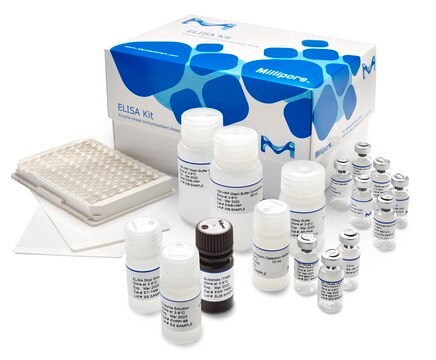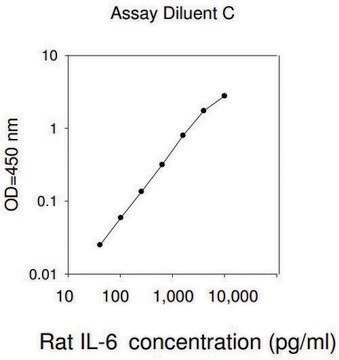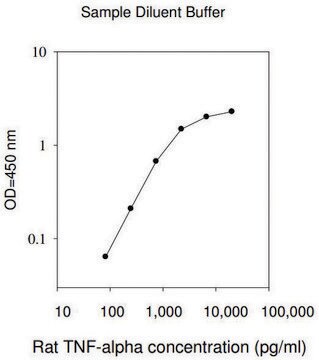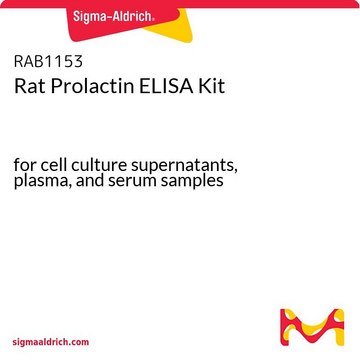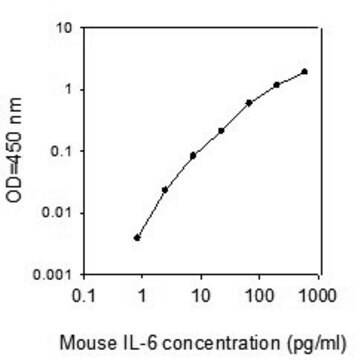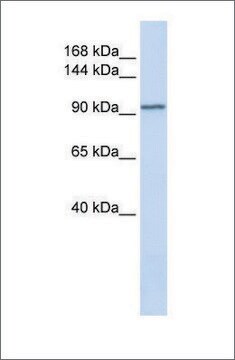EZRMFGF21
Rat/Mouse FGF-21 ELISA Kit
measures and quantifies FGF-21 levels in 10 µl - 20 µl serum, plasma or cell culture supernatent
Synonym(s):
Fibroblast growth factor 21
About This Item
Recommended Products
product name
Rat / Mouse FGF-21 ELISA Kit, This Rat / Mouse FGF-21 ELISA Kit is used to measure & quantify FGF-21 levels in Metabolism & Inflammation & Immunology research.
Quality Level
species reactivity
mouse, rat
packaging
kit of 1 × 96 wells
parameter
10—20 μL sample volume (4hr assay)
assay range
standard curve range: 50-12000 pg/mL
inter-assay cv: <8%
intra-assay cv: <10%
technique(s)
ELISA: suitable
input
sample type cell culture supernatant
sample type serum
sample type plasma (K2 EDTA)
application(s)
research use
detection method
colorimetric (450nm/590nm)
shipped in
wet ice
storage temp.
2-8°C
General description
Although considerable progress has been made in the understanding of the pathobiology of type 2 diabetes, as well in the development of new compounds for the treatment of diabetic patients, this disease remains a major global health concern. Consequently, Millipore is pleased to offer the Rat/Mouse FGF-21 ELISA kit for the quantification of FGF-21 in rat and mouse serum and plasma samples. The insulin-independent activities of FGF-21, as well as the absence of the weight gain effects of insulin, thiazolidinediones and other anti-diabetic drugs, distinguish it from current insulin-sensitizing drugs, making it a promising therapeutic.
Specificity
No significant cross-reactivity to the cytokines and metabolic hormones tested was observed.
Application
Metabolism
Diabetes - Type 2
Metabolic Syndrome
Other Notes
Disclaimer
Signal Word
Danger
Hazard Statements
Precautionary Statements
Hazard Classifications
Acute Tox. 3 Dermal - Acute Tox. 4 Inhalation - Acute Tox. 4 Oral - Aquatic Chronic 2 - Eye Irrit. 2 - Met. Corr. 1 - Skin Sens. 1 - STOT SE 3
Target Organs
Respiratory system
Storage Class Code
6.1C - Combustible acute toxic Cat.3 / toxic compounds or compounds which causing chronic effects
Regulatory Listings
Regulatory Listings are mainly provided for chemical products. Only limited information can be provided here for non-chemical products. No entry means none of the components are listed. It is the user’s obligation to ensure the safe and legal use of the product.
JAN Code
EZRMFGF21-26BK:
EZRMFGF21-26K:
Certificates of Analysis (COA)
Search for Certificates of Analysis (COA) by entering the products Lot/Batch Number. Lot and Batch Numbers can be found on a product’s label following the words ‘Lot’ or ‘Batch’.
Already Own This Product?
Find documentation for the products that you have recently purchased in the Document Library.
Our team of scientists has experience in all areas of research including Life Science, Material Science, Chemical Synthesis, Chromatography, Analytical and many others.
Contact Technical Service
